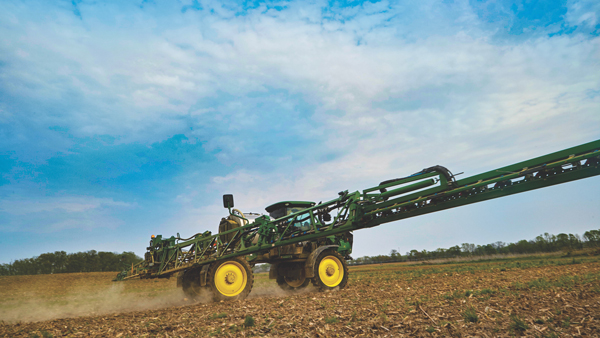Weed Control for No-Till Soybeans

Regain control of your fields with Sharpen herbicide
The wet conditions experienced by many growers in the Midwest during the 2019 season may be behind us, but the effects will be long-lasting. Delayed planting and unusually high prevent plant acres left growers no choice but to abandon their preferred herbicide program compromising the timing and success of their weed control practices.
The issue with the high number of prevent plant acres combined with delayed planting is twofold. On prevent plant acres many growers were not able to effectively control weeds leading to an increase in the weed seed bank that will be problematic throughout the 2020 season. Additionally, later planting led to a delayed harvest preventing growers from applying a fall burndown treatment. This places increased pressure on current technologies and trait systems at planting because winter annuals and early emerging spring weeds will be more prevalent and tougher to control. To avoid an especially difficult and weedy season, no-till growers must use an effective burndown herbicide this spring to control emerged weeds.
“Every season, there are elements growers can’t control, but starting with clean fields is the best way to set themselves up for success,” said BASF Technical Market Manager Andrew Adams. “If growers, particularly no-till growers, didn’t have a chance to apply a burndown herbicide following harvest, they should incorporate a burndown like Sharpen® herbicide on their soybean fields before planting.”
Powered by Kixor® herbicide technology, Sharpen herbicide works quickly, driving burndown three to five times faster than 2, 4-D or glyphosate.1 The herbicide provides flexible burndown of broadleaf weeds when applied preplant and/or preemergence, controlling:
- Bedstraw
- Common mallow
- Dandelion
- Horseweed (marestail)
- Kochia
- Mustard (black, wild, tumble)
- Narrowleaf hawksbeard
- Prickly lettuce
- Russian thistle
- Wild buckwheat
- Common lambsquarters
- Pigweed spp
Key components of any effective weed management strategy today must include multiple effective modes of action, as well as multiple application timings. Sharpen herbicide allows growers the flexibility and confidence to start clean with a robust burndown program, regardless of the trait platform they choose.
“Because of the delayed harvest, we’re going to see a lot of weedy fields with a larger, denser weed canopy, especially in no-till and prevent plant acres,” said Adams. “Growers should be sure to include both pre- and postemergence herbicides, targeting small weeds, abiding by the labeled rate, and including residuals and post herbicides for longer control.”
An additional benefit of starting with a burndown like Sharpen herbicide is that cleaner fields allow no-till growers an earlier planting window and improved operational efficiency. For best performance, burndown herbicides should be applied when weeds are small and actively growing. Then, growers should follow up with additional herbicide applications in accordance with their long-term weed management plan. To learn more about Sharpen herbicide, talk to your local BASF representative, or visit SharpenHerbicide.com.
Always read and follow label directions.
Kixor and Sharpen are registered trademarks of BASF.
© 2020 BASF Corporation. All rights reserved.
About BASF’s Agricultural Solutions division
With a rapidly growing population, the world is increasingly dependent on our ability to develop and maintain sustainable agriculture and healthy environments. Working with farmers, agricultural professionals, pest management experts and others, it is our role to help make this possible. That’s why we invest in a strong R&D pipeline and broad portfolio, including seeds and traits, chemical and biological crop protection, soil management, plant health, pest control and digital farming. With expert teams in the lab, field, office and in production, we connect innovative thinking and down-to-earth action to create real world ideas that work — for farmers, society and the planet. In 2018, our division generated sales of €6.2 billion. For more information, please visit www.agriculture.basf.com or any of our social media channels.
About BASF
At BASF, we create chemistry for a sustainable future. We combine economic success with environmental protection and social responsibility. The approximately 122,000 employees in the BASF Group work on contributing to the success of our customers in nearly all sectors and almost every country in the world. Our portfolio is organized into six segments: Chemicals, Materials, Industrial Solutions, Surface Technologies, Nutrition & Care and Agricultural Solutions. BASF generated sales of around €63 billion in 2018. BASF shares are traded on the stock exchange in Frankfurt (BAS) and as American Depositary Receipts (BASFY) in the U.S. Further information at www.basf.com.
